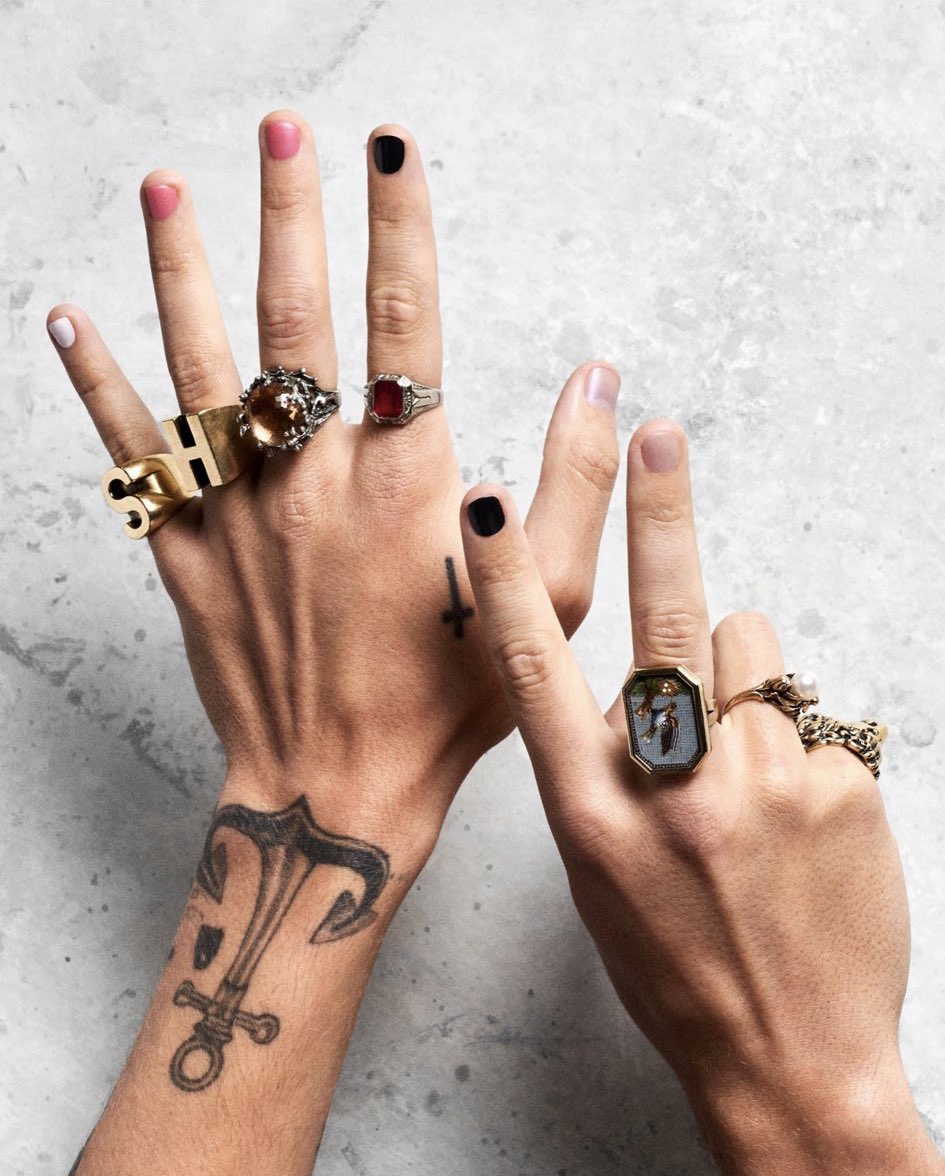By Mallory McGovern
Today, for $20 a pop, you can get nail polish developed by Harry Styles and modeled on his manicured, ring-adorned hands, through his new company, Pleasing. This beauty business venture is only the latest of Styles’ embrace of non-normative gender roles. While known to fans, Styles’ artistic choices came into the public conversation following his December 2020 cover of Vogue as the first man to score a solo cover on the most notable fashion magazine of the last century. By simply posing in a dress for Vogue, Styles ignited an online firestorm, but the question is, why? Styles is far from the first man to wear a dress, and a focus on his fashion choices may serve as a distraction from the long legacy of gender and queer activists. So what is it about an attractive pop star that gets us talking, and should we reframe our conversation?
Given his rising star power and vocal fanbase at the time of Vogue’s release, it was no surprise when right-wing pundit Candance Owens took to Twitter to decry the loss of “manly men.”
Stars were quick to take to Twitter in defense of experimenting with gender expression. Styles would ultimately shatter the Internet again—this time in a pantsuit—with a photograph of him eating a banana under the caption “Bring back manly men.”
However, more critical commentary didn’t hit the stands until nearly a year later when actor and fashion icon Billy Porter voiced his discontent over the accolades given to Styles in an interview with The Sunday Times. Discussing Styles, Porter stated “He doesn’t care, he’s just doing it because it’s the thing to do. This is politics for me. This is my life. I had to fight my entire life to get to the place where I could wear a dress to the Oscars … All he has to do is be white and straight.” Porter realized he misspoke (and ultimately issued an apology) in attacking Styles, acknowledging that the issue is far bigger than either star and that Porter, contrary to his initial claims, certainly cannot take on the role of cultural vanguard for genderfluid dress.
Porter, who is deeply invested in the political implications of these actions as a gay man of color, may have unintentionally overshadowed the countless transgender and queer performers, intellectuals, and activists of color that came before him. Of course, the stakes of such gender expression become increasingly dangerous for many people that aren’t like Styles when factors such as class, race, gender, and sexuality come into consideration. Attacking Porter for an ineloquent comment on the established legacy of gender-bending fashion likely won’t result in any productive conversation, but arguably, lauding Harry Styles for his bold fashion choices won’t do anything either.
Styles is far from the first pop star to directly incorporate gender into performance. Nor is he the first to hint at an affinity for, if not an identification, with the LGBTQ+ community. David Bowie, one of the ‘70s biggest stars and British as well, came out as gay in a 1972 interview before later identifying as bisexual. At the same time, he was still engaging in his own form of alien-rocker drag. While Bowie’s fashion seems to be remembered by the public, his outspokenness seems to have fallen at the cultural-historical wayside. His 1972 declaration came only 5 years after the U.K.’s decriminalization of homosexuality and 3 years after Stonewall, a riot often seen as the starting point of America’s modern gay rights movement. All of this is not to say that Bowie’s actions or Styles’ actions didn’t matter—of course, the cultural is often political. But why has it taken fans so long to catch up? Why is it revolutionary when an artist makes an artistic choice? It seems that modern fans of Harry Styles are only the latest victims of a process of cultural forgetting.
With Pleasing, Styles has distilled his gender fluidity into a product that his fans—primarily young, socially conscious women and girls—are unsurprisingly eager to buy. The genderless nail polish and skin serums are marketed under the tagline “Find your pleasing.” Welcoming and non-judgemental, the line invites beauty and pop culture fans to make their purchase. While the brand markets itself on its neutrality, simple fashion and beauty choices have long been political and at times dangerous. Yet, for Styles, the embrace of gender fluidity has become a powerful tool for marketing himself as an artist, and now, as a brand owner. While you can’t deny the power celebrities can have on the cultural conversation, we need to remind ourselves to continue the discussion beyond the attractive idols that present it as artistic ingenuity. What Styles is doing is by no means bad, but it’s also not new or revolutionary. In our rush to applaud Harry Styles, we may be missing the important work at hand. So, feel free to doll yourself up with Pleasing’s $65 nail polish set, but don’t pretend helping your favorite pop star profit is a revolutionary act.

